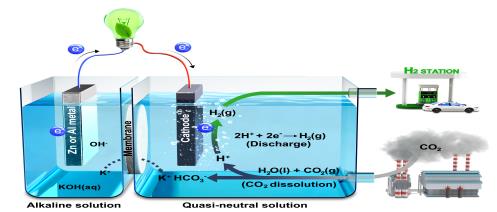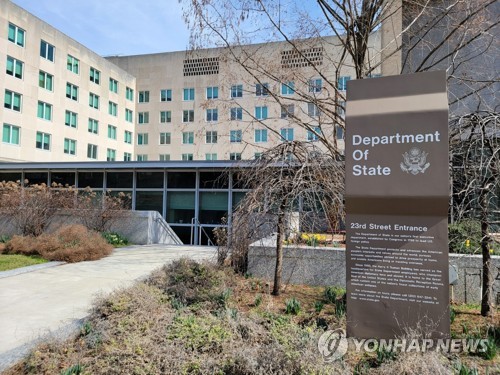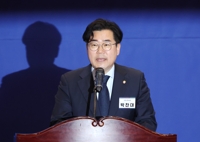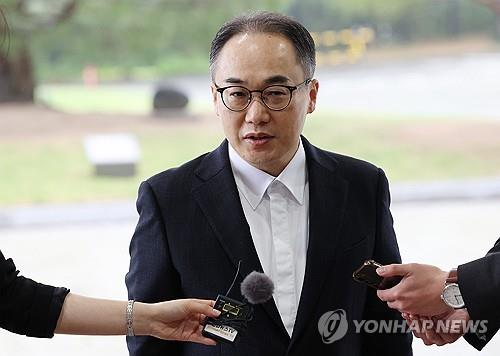Researchers develop efficient way to make H2, electricity from CO2
SEOUL, June 4 (Yonhap) -- A group of South Korean researchers on Tuesday said they have developed a simple and efficient process to make clean energy from carbon dioxide (CO2), which is cited as a major cause of global warming.
The system that uses plain water, catalysts made from reusable and cheap zinc or aluminum, an easy to make membrane, and CO2 dissolved in water can produce electricity, pure hydrogen (H2) and even baking soda, according to the research team led by Kim Gun-tae, a professor of energy engineering at Ulsan National Institute of Science and Technology (UNIST).
"The chemical and electrochemical reactions in this new system are not complicated at all and the entire process can easily be expanded for commercial applications," Kim said.
According to Kim, with the new method alone, a ton of waste CO2 can be transformed into US$200 worth of usable resources without environmental fallout.

This image, provided by UNIST, shows the process of turning CO2 into H2 and electricity. (PHOTO NOT FOR SALE) (Yonhap)
"CO2 created by people breathing, from the burning of fossil fuel and by industries is a stable gas that is hard to change, but if it is dissolved in water, it can be made into something else," Kim said.
Without going into detail, the UNIST scientist said large local chemical companies and steel mills have shown considerable interest, as the process can deal with the large quantities of CO2 created in their manufacturing processes. Also, the companies must pay taxes for CO2 they create and release into the atmosphere.
If there is full-fledged support, the CO2 conversion process could be operational in about a year, he said.
Such a development, moreover, can help South Korea reduce its greenhouse gas emissions and stimulate growth of the capture, utilization and sequestration business sector.
In addition, due to its simplicity, the process can make it relatively cheap to build hydrogen charging stations across the country, which can be a boon for fuel cell cars.
Kim said some 30 patents related to the process have been secured so far, with the results being published in the latest issue of the international Angewandte Chemie journal.
yonngong@yna.co.kr
(END)
-
 BTS' Jungkook's 'Seven' chosen as hottest hit outside U.S.
BTS' Jungkook's 'Seven' chosen as hottest hit outside U.S. -
 BTS' RM to prerelease 'Come Back to Me,' music video directed by Lee Jung-jin of 'Beef'
BTS' RM to prerelease 'Come Back to Me,' music video directed by Lee Jung-jin of 'Beef' -
 From pastime to academic discipline: Exhibition spotlights evolution of Korean embroidery
From pastime to academic discipline: Exhibition spotlights evolution of Korean embroidery -
 N. Korea dismantles S. Korean building near shuttered Kaesong complex
N. Korea dismantles S. Korean building near shuttered Kaesong complex -
 Yoon pledges to increase monthly senior basic pension benefit
Yoon pledges to increase monthly senior basic pension benefit
-
 From pastime to academic discipline: Exhibition spotlights evolution of Korean embroidery
From pastime to academic discipline: Exhibition spotlights evolution of Korean embroidery -
 BTS' RM to prerelease 'Come Back to Me,' music video directed by Lee Jung-jin of 'Beef'
BTS' RM to prerelease 'Come Back to Me,' music video directed by Lee Jung-jin of 'Beef' -
 BTS' Jungkook's 'Seven' chosen as hottest hit outside U.S.
BTS' Jungkook's 'Seven' chosen as hottest hit outside U.S. -
 Trump suggests U.S. could withdraw its troops if S. Korea does not contribute more to support USFK: TIME
Trump suggests U.S. could withdraw its troops if S. Korea does not contribute more to support USFK: TIME -
 (Yonhap Interview) U.S. will do 'all' it can to back S. Korea in case of China's economic coercion: official
(Yonhap Interview) U.S. will do 'all' it can to back S. Korea in case of China's economic coercion: official
-
 BTS' RM to prerelease 'Come Back to Me,' music video directed by Lee Jung-jin of 'Beef'
BTS' RM to prerelease 'Come Back to Me,' music video directed by Lee Jung-jin of 'Beef' -
 Indonesia proposes cutting payment for joint fighter jet project with S. Korea to one-third
Indonesia proposes cutting payment for joint fighter jet project with S. Korea to one-third -
 S. Korea, China in final stage of talks on FM Cho's visit to Beijing
S. Korea, China in final stage of talks on FM Cho's visit to Beijing -
 DP to propose cash handouts as 1st bill of new National Assembly
DP to propose cash handouts as 1st bill of new National Assembly -
 S. Korea's working-age population to dip nearly 10 mln by 2044 amid low births
S. Korea's working-age population to dip nearly 10 mln by 2044 amid low births



















